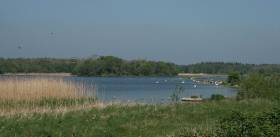Displaying items by tag: Lough Ennell
A €60 million project to improve the quality of inland waters has been initiated by Minister for Marine Charlie McConalogue.
McConalogue was on the shores of Lough Ennell in Co Westmeath on Thursday (March 7) to mark the new programme with junior ministers Pippa Hackett and Malcolm Noonan.
The €60 million “Farming for Water” project aims to improve water quality at local, catchment and national levels.
The project is a collaborative approach between the Department of Agriculture, Food and the Marine and the Department of Housing, Local Government and Heritage, working in partnership with the agri-food industry to improve water quality.
McConalogue’s department will support the project through funding of €50 million for participating farmers, co-funded by the national exchequer and the EU.
It has set a target of involving 15,000 farmers in priority areas nationally. The Department of Housing, Local Government and Heritage will provide administrative support for the project to the value of €10 million.
The European Innovation Partnership (EIP-AGRI) project has established an operational group, run by the Local Authority Waters Programme (LAWPRO), in partnership with Teagasc, Dairy Industry Ireland (DII) and Bord Bia.
This will support a number of targeted actions at farm level to improve water quality.
“Our rivers, lakes, estuaries and bays are at the heart of what we value about Ireland’s environment. Improving the quality of their waters is vital – not just for nature and wildlife, but also for public health and wellbeing,” Noonan said.
“It is testament to the commitment of Government departments and the agricultural sector in taking ownership of their role in improving water quality,” Noonan noted.
Fish Stock Survey On Lough Ennell This Week
#Angling - Inland Fisheries Ireland (IFI) is currently carrying out a fish stock survey on Lough Ennell, near Mullingar, to assess the current status of the fish populations in the lake.
The survey takes place from today (Tuesday 19 September) till the Friday (22 September) and will involve netting throughout the lake undertaken by IFI staff from Limerick and research staff from Citywest headquarters crewing a total of two boats.
It’s expected that the survey will provide a range of information on the fish stocks in the lake, such as size distributions of fish captured, age and growth information for all species, diet of selected species, and catch per unit effort (CPUEs) for each fish species.
Samples for genetic analyses of brown trout and pike will also be taken. The information collected will assist IFI in managing, conserving and monitoring any changes in the fish stocks of the lake.
The survey crews will be very visible on the lake and all sets of nets will be marked with distinctive buoys labelled ‘IFI Survey’. Any anglers or other lake users are asked to be vigilant if out and about on the lake to avoid snagging in the nets.
Further details on the background of this survey are available on the IFI website.





























































